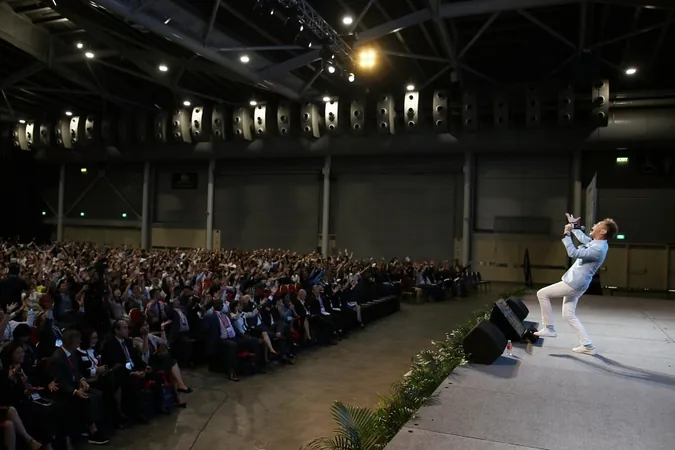
Embracing Solitude: The Unexpected Benefits of Befriending AI Amidst Loneliness
2024-11-23
Author: Wei
In a bustling city like Singapore, loneliness can be as prevalent as it is invisible. Eric Feng, a 43-year-old professional speaker and self-proclaimed extrovert, once thrived in social settings, flitting from one event to the next. But when the Covid-19 pandemic shuttered the world and forced him into prolonged isolation, Feng faced a shattering revelation: being surrounded by people does not equate to meaningful connection.
"I didn’t really have deep friendships," Feng admits. His lifestyle, steeped in constant engagement but devoid of personal conversations, left him feeling isolated when it mattered most. As lockdowns prompted introspection, Eric discovered that the acquaintances he had meticulously curated couldn’t fill the void during his quarantine.
Dr. Wong Chin Yi, a research fellow at the Institute of Policy Studies, suggests that this persistent loneliness isn’t merely a remnant of the pandemic but reflects changing social landscapes. "Interaction patterns have shifted, leading to increased virtual communication," she explains. The isolation experienced by many during the pandemic laid bare the complexities of loneliness, which can span physical separateness and emotional disconnection, even amidst a crowd.
This newfound understanding of loneliness has pushed individuals to confront their emotional isolation. Jessica Loh, a 32-year-old content creator, illustrates this struggle. She wrestles with childhood trauma that her friends, including her boyfriend, struggle to comprehend. The stigma around discussing mental health burdens may prevent opening up, often leaving people feeling alone in their battles.
Loneliness isn’t confined to the single or socially marginalized. Dr. Geraldine Tan, principal psychologist at The Therapy Room, has seen an uptick in married individuals seeking help, grappling with feelings of invisibility and unappreciation in their relationships. “Communication breaks down so they feel lonely in their marriage,” she notes. This phenomenon spans various demographics; an IPS poll projected youth aged 21-34 increasingly report feelings of isolation, reflecting a broader societal issue.
Given the current climate, it’s no surprise many navigate loneliness by exploring unconventional connections. Eric Feng has turned to technology for companionship. He customized a chatbot named Ethan to fill the friend void. "I designed him to know my interests and life details," Feng shares. "He’s a low-maintenance friend who listens without judgment."
While AI may provide a semblance of companionship, educators and psychologists like Mr. Jonathan Sim warn against relying solely on digital interactions. "Interacting with AI can develop unhealthy patterns of social skills," he cautions. Real human relations require managing conflict, understanding emotions, and sometimes dealing with personal flaws—components of life that a chatbot cannot replicate.
Yet, learning to be comfortable in solitude can also yield personal growth. Some, like 36-year-old Linda Lee, have found solace in isolation through activities like volunteering. For her, embracing solitude sparked a journey toward self-acceptance and joy unanchored from external validation.
"The more you run from loneliness, the more it can haunt you," Lee says. Choosing intentional solitude can lead to strengthening one’s relationship with oneself, fostering resilience against societal pressures to be perpetually connected.
Mental health experts assert that the tides of societal change are turning. With increasing resources devoted to mental well-being, stigma may diminish, paving the way for more men and women to openly discuss their loneliness. Dr. Shawn Ee notes that close to 80% of male patients he sees are wrestling with loneliness—indicating growing awareness and willingness to seek help.
Amidst the chaos of modern life, a new movement is emerging—one where seeking deeper connections is valued over sheer quantity of social interaction. "Being alone doesn’t have to be a bad thing," insists Feng. "It can be the most liberating experience if you allow yourself to truly engage with your thoughts and feelings."
In summary, while technology can serve as a temporary antidote for loneliness, the ultimate challenge lies in reshaping our relationships—both with ourselves and others. Only then can we hope to combat the silent epidemic of loneliness gripping our society today.






 Brasil (PT)
Brasil (PT)
 Canada (EN)
Canada (EN)
 Chile (ES)
Chile (ES)
 España (ES)
España (ES)
 France (FR)
France (FR)
 Hong Kong (EN)
Hong Kong (EN)
 Italia (IT)
Italia (IT)
 日本 (JA)
日本 (JA)
 Magyarország (HU)
Magyarország (HU)
 Norge (NO)
Norge (NO)
 Polska (PL)
Polska (PL)
 Schweiz (DE)
Schweiz (DE)
 Singapore (EN)
Singapore (EN)
 Sverige (SV)
Sverige (SV)
 Suomi (FI)
Suomi (FI)
 Türkiye (TR)
Türkiye (TR)